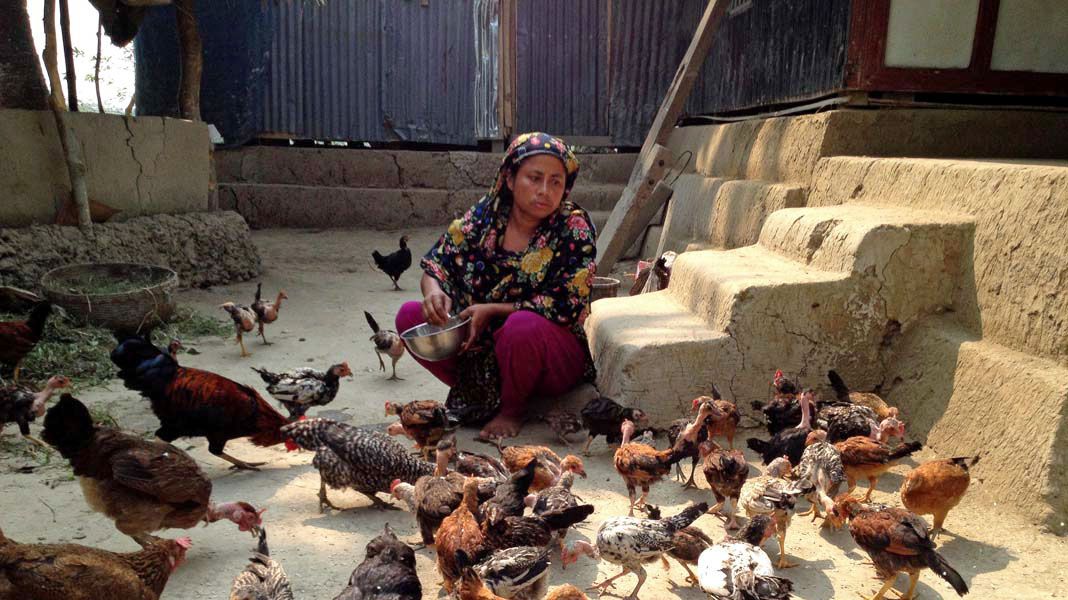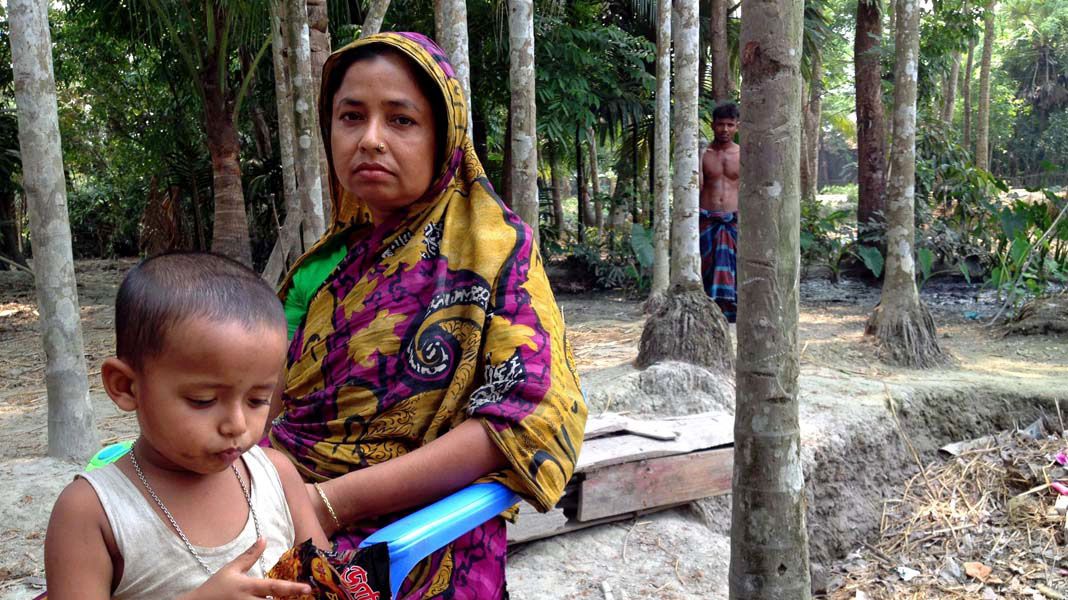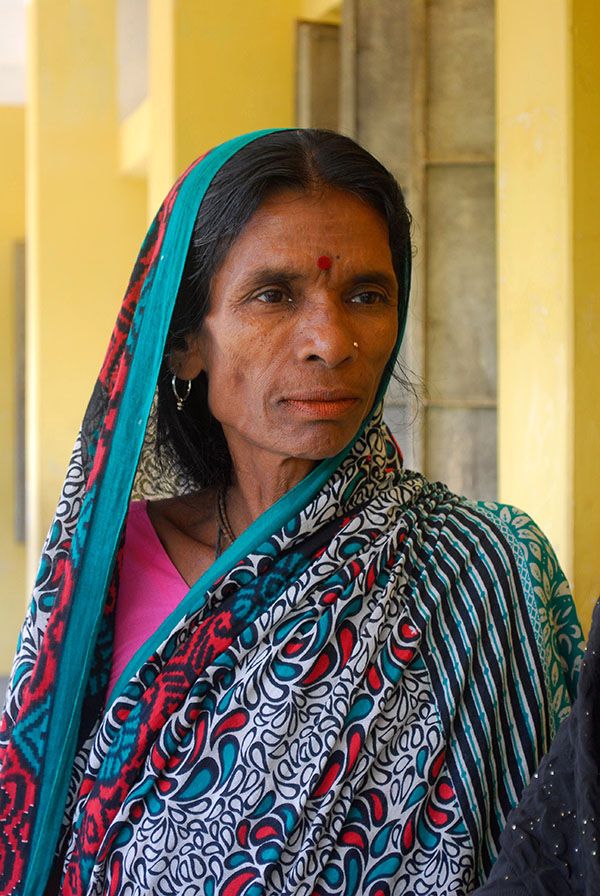Earning money is key to women’s empowerment

By improving agriculture water management in the polders of coastal Bangladesh the Blue Gold Program pursues socio-economic development and diversified land use, creating opportunities for women to engage in farming and earn their own money.
Sitting on a large plastic sheet spread out in a shady spot, some women are patiently waiting for the delayed visitors. They welcome them with visible ease, while one of them goes off to call other members of their local water management group. By now the women are accustomed to receiving a steady flow of visitors, Bangladeshi and foreigners alike, who come to see their successful backyard poultry initiative.
The women are also used their guests often arrive late. Although Chinguria village is not that far from Patuakhali, the Galashipa river cuts the highway in two and can only be crossed by ferry. It’s the ferry that dictates the travel time in these coastal polders.
Water plays a dominant role in the lives of the women of Chingurai. Living in a polder, water both nurtures and threatens their existence. That is why they joined the local water management group when the Blue Gold Program started working in their area in 2016; to have a sense of control over of the flow of water, over the embankments, channels and sluices. These structures have a multiple use: they can let the water into the polder for irrigation, keep it out to protect them from flooding, and drain the waterlogged fields if needed. Joining the water management group allows the women to take some control of their lives and livelihood.
“We got even more”, says Josna Begum, confidently summarising the enthusiastic responses of her fellow members. “We were trained in modern backyard poultry techniques. We learned to earn our own money. Now we contribute to the household income, we get respect from our family and community.”
Creating opportunities
Blue Gold Program is not just about participatory water management. Starting in 2013, it aims to reduce poverty and increase food security for about 200,000 households in an area of 115,000 ha. in south-west coastal Bangladesh. Improved agriculture water management is a stepping stone, to ignite socio-economic development in an area where about 38 percent of the population lives in poverty and faces insecurity of food, income, water, and education.
“Agriculture is the main drive of the economy in these polders,” stresses Guy Jones, the team leader of Blue Gold. “Our interventions motivate and facilitate the communities to increase their productivity and improve their livelihood. For both men and women.”
To promote gender equality Blue Gold, from its start in 2013, strives to allocate at least forty percent of the membership of local water management groups to women, and minimum thirty percent women in the executive committees. However, mere numbers are not enough, stresses Roksana Begum, the gender coordinator of Blue Gold. Women too often they don’t dare to speak out in the presence of men or are being ignored or snapped at. During one meeting female executive members sat on the floor with the other women member, while the male executives were sitting in chairs opposite them.
Women in these coastal regions have to tackle a lot of hurdles to overcome gender based cultural taboos and beliefs. Additional support and training is required to have meaningful and active participation of women. “Women empowerment is a process, it doesn't happen overnight, notes the gender coordinator.
Small changes, big impact
In Chinguria village it all started with a series of weekly Farmer Field School sessions on poultry and homestead gardening for 25 women. Josna Begum, a housewife, was one of the participants, as was her neighbour Joynob, a farmer-cum-tailor, whose backyard became an outdoor classroom with a two-story, four-chamber hen house as trial.
Like all participants Josna and Joynob were used to rear chicken. “In the traditional way, letting them roam around freely,” explains Joynob, “just for our own consumption.” Selling eggs or chicken was not an option. Half the chicks would disappear, eaten by birds; hens died of diseases or fights; hatching occurred irregular, and only half the eggs would produce chicks.
With a simple hen house and proper vaccination, the losses can be reduced to almost zero, the women discovered during the training. Seeing Jobnoy earning some 5,000 taka per month at the end of the training, the other women were ready for business. Josna convinced her husband to invest 10,000 taka in her hen house. Fellow participants sold their livestock, took a loan or started saving money to get started.
With their financial contribution to the household the women now enjoy better marital relationship. The humiliations and beatings have mostly stopped; husbands now discuss business with their wives and decisions are taken jointly more often.
Inspired by the success stories, other neighbours followed. Now every second household in the village has a hen house, and the poultry business is spreading from village to village through the Blue Gold exchange meetings for horizontal learning.
“It’s a huge step forward for the women, notes Nahar, the Blue Gold community development facilitator who organised the training. She experienced it herself. Earning money is the key to gain respect and self-dependence.

Earning self-dependence
Blue Gold’s participatory water management stimulates the economic and social development of women in different ways. As an implementing agent, the Bangladesh Water Development Board (BWDB) contracts the earthwork on embankments and associated structures to local water management groups to provide work for landless members, both men and women. For women it offers a unique chance to earn money to invest in various income generating activities. In polder 43/2D the divorced Priobala (42) was able to buy some land and ducks with her earnings, and invest a small amount in collective fish cultivation in her village, to secure self-dependence.
In Daksin Sonakhali village, in polder 43/1A, the improved water management resulted in higher participation of women in agriculture as farmers could drain their land in time for a third, winter crop season. This made it worthwhile to also cultivate the high yield-short duration Aman rice variety, since it can be harvested just before the start of the winter crop season. The extension workers of the Department of Agriculture (DAE) another implementation agency of Blue Gold, were very happy. After years of promoting high yielding varieties without much success, farmers are now finally interested in intensifying farming and increasing productivity, as improved water management makes it possible.
Women’s empowerment takes time
In recent years many farmers in Daksin Sonakhali have opted for watermelon, a highly profitable but risky and labour-intensive crop. Therefore women were asked to work in fields, along with their husbands and children. They actually did most of the work, like land preparation, sowing, weeding, watering and harvesting. However, their husbands handled the sale of the harvest, pocketing the money. The women were left empty handed being treated as unpaid labour.
Responding to their complaints, Blue Gold last year organised a pilot training on market linkage development and women empowerment for some fifty members, mostly women. “We never got a chance to sell our products,” explains Nipa, one of the trainees. “But now that we got to know the prices of inputs and learned how to calculate how much produce we will harvest, we can also negotiate a good price.” Nipa’s husband now asks her to contact the buyers and make a deal. “He doesn’t shout at me anymore, we discuss business.”
Her neighbour Shobuj nods. “We, menfolk, only became aware of our women’s skills after the training. We now allow our women to work in the field and go to the market. They know what to do.” Men also realise it is better to share the responsibility with their wives, so earnings increase for the benefit of the family. Hesitant but gradually men are changing their attitude towards women. And their wives have started reminding them to do their share of household chores.
The changes are visible for all. Women from nearby villages also like to follow suit, saying “we also want to lead a happier live”.

Tulu Bibi (35) poultry farmer, Chinguria
It took Tulu Bibi six months to save enough money to build her two-story, four-compartment hen house of 10,000 taka. Now she can earn that amount in one month selling eggs and chicken, thanks to the new techniques she learned at Blue Gold’s Farmer Field School. “Earlier, when I had to ask my husband for money, he would scold me, and beat me. Now I pay it from my own pocket.” Earning money earns her respect from the community, family, and husband, who now discuss business with her.

Priobala (43) farmer-cum-day labourer
Live hasn’t been easy for Priobala. Left by her husband, childless, and without family, she does whatever it takes to earn money and be active in her community. So she got involved in Blue Gold in 2014, first as ordinary member of the local WMG, now as executive member and leader of the local women’s group of the Labour Contracting Society (LCS). With the earthwork assignment of LCS Priobala could earn a good income and invest it in land and ducks, buying inputs for mung bean and rice cultivation, and taking a share in a collectively run fishpond. “Now I am self-dependent, I feel more secure and respected.”






Member discussion